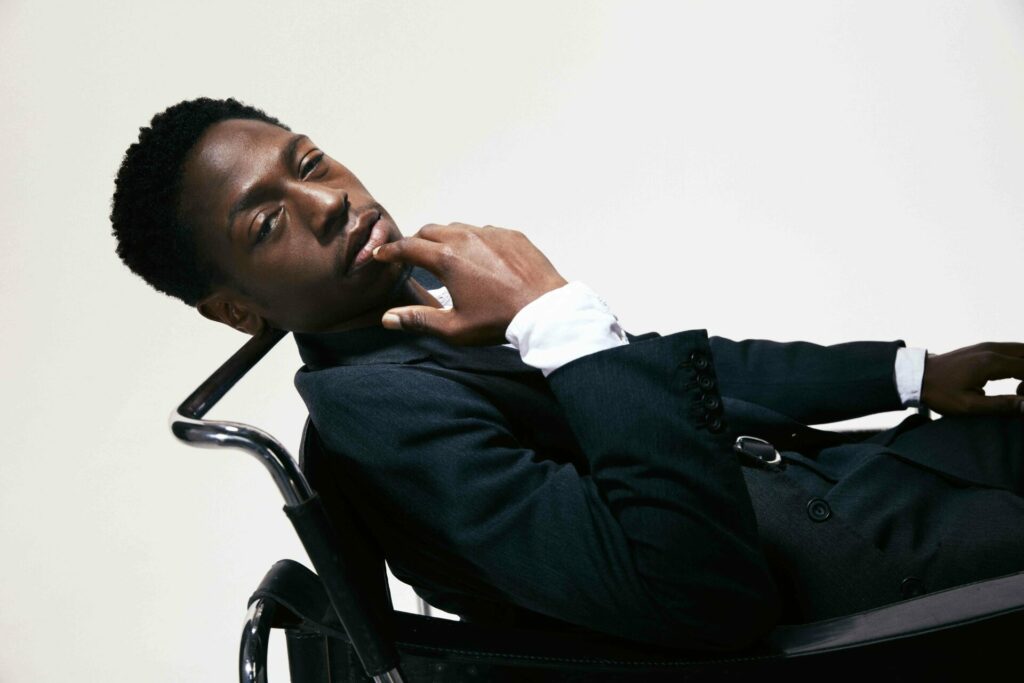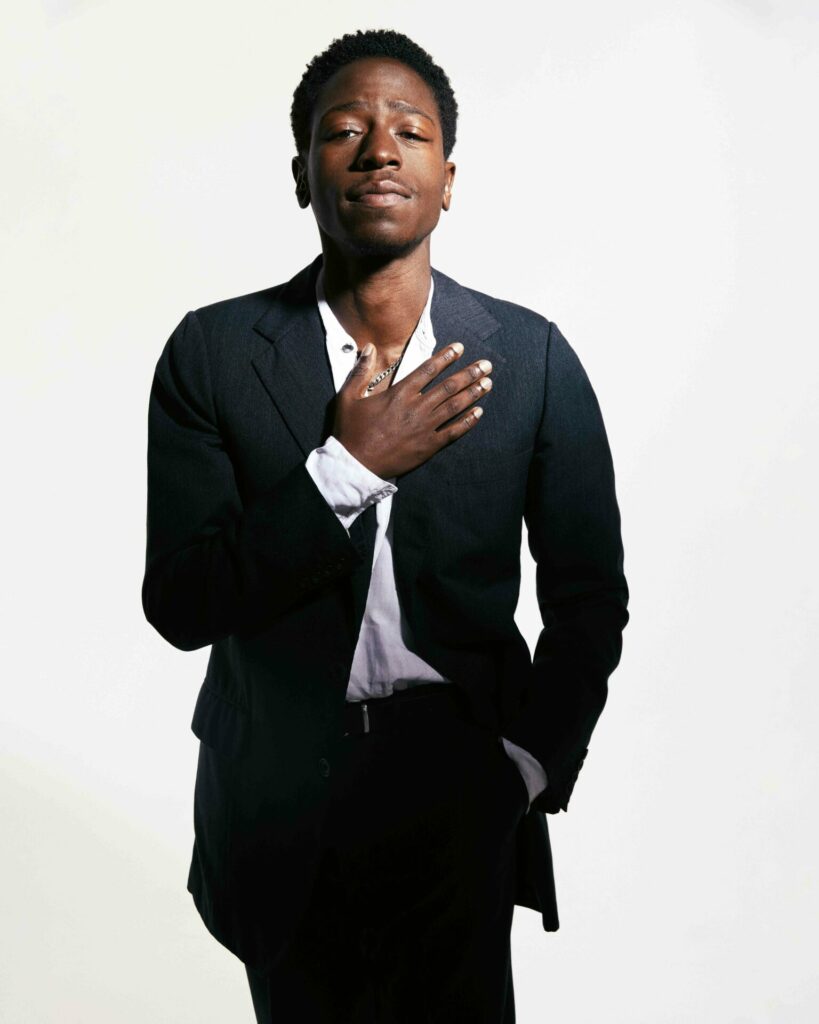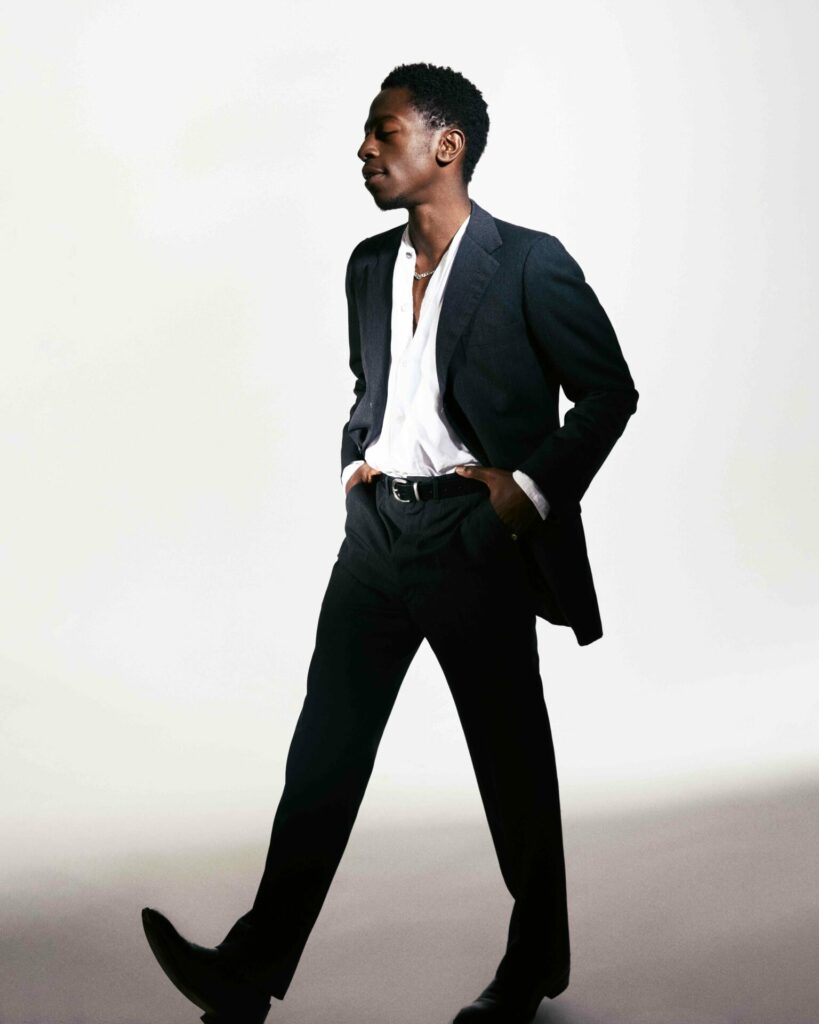Alien territory: David Jonsson
From Industry to Rye Lane, and now heading into the depths of space with Alien: Romulus, David Jonsson is on a stellar trajectory

The roof of Shoreditch House in east London is a suitable vantage point from which to take in David Jonsson’s impressive rise from aspiring young theatre actor to his status as one of Britain’s most exciting emerging screen stars. “There’s no greater feeling, man,” says Jonsson, on his pride at representing his home city on screen. “This is everything to me. I mean, literally, look at where we’re at — it’s awesome!
“That’s Industry over [there],” he says, pointing to the towering steel and glass peaks of The City a couple of hundred metres south of us that inspired the hit HBO/BBC series Industry, for which he received global attention for his role as Gus, an aspiring banker. Hailing from Custom House, near the Docklands a little further east, as a child the streets of inner London were Jonsson’s back yard. Further south is Peckham, the location of wonderful British romantic comedy Rye Lane, in which he starred.
“I mean, this is where I grew up. It’s amazing to have that on my shoulders,” he says effusively. “I don’t take it lightly, but it does mean to me that I’ve got to push it further, you know what I mean? I’ve got to do it different. Not necessarily bigger, just different to how other people have done it in the past.” And so, on to different. Jonsson’s next screen outing will take him way beyond London’s boundaries and into the depths of space for the part of synthetic android Andy in Alien: Romulus, directed by Fede Alvarez.
“The Alien films are iconic; it’s proper cinema,” says Jonsson of the pressure of stepping into a character archetype previously spearheaded so authoritatively by the likes of Lance Henriksen and Michael Fassbender. “But for me, I’m not bothered about studio, or scale, or anything. I’m bothered about character and a good script. For me, it was all about Andy, who he was. I’ve just never read such an interesting character. He has a lot of traits to him that I had to investigate and delve into, and I love that. Character is everything to me.”
What did you know about Alien before you went into the film?
I love film. I love cinema. I’m a big fan, so I know all the greats. But to be honest with you, it’s kind of a bit before my time, you know what I mean? Also, I’m not massively a sci-fi head. I know that Alien is top cinema. I went back and watched every single film in the series from start to finish, which was an absolute joy and pleasure. And mildly intimidating. What Ridley Scott did with the first film, and then James Cameron taking it to a new place, it was just amazing. So, our film is set between Alien and Aliens. This is a standalone, but also there’s more to be done in our mini universe.
What does Fede [Alvarez] bring to the Alien series that is new and fresh?
Fede is a master. He’s really good at, first of all, creating horror and tension. He lives there. I’ve never met someone who knows how to do that more seamlessly than he does. When I first met him, we just spoke about films that we loved. He wanted to create something that was all about characters and family and the relationships that are so ingrained in us, because if you set that up, you knock them down with the drama and the horror. He’s phenomenal in that. We spent loads of time rehearsing before we did anything, and that’s rare because time is money and all that.
What was the big budget film experience like?
Mildly intimidating. I’m an indie boy, that’s where I live. To go from that to a hundred-million-dollar movie — it was massive. After my first two films, I got straight into playing the lead in a studio film. It is a big jump, but it is a story first; once you find a good story, you don’t care if it’s, like, a hundred mill or one mill or a hundred quid. I’ll do a good script anywhere I can.
You play an android, which have held pivotal roles in all of the various Alien films. They start off in the first film as a villainous character that is actually a traitor to the humans. Then, in the second film, Bishop acts as a kind of saviour to Ripley, through to Michael Fassbender’s more complex character of David in Prometheus and Covenant. How does Andy relate to these previous androids?
Well, first of all, it’s an honour. I can’t believe my name’s next to those people — that’s crazy. Michael Fassbender is awesome. Ian Holm, awesome. It’s the actors and their interpretation that allows you to say everything you just said about the characters. And that’s what I hope I’ve done with Andy. There’s more to them than just the script and the lines. I think the wonderful thing about synthetic androids is that they are kind of what you make ’em, you know what I mean? And they turn on a sixpence. You never know quite what to make [of] technology, whether they’re helping us or they’re pulling away from us. And that was the complexity that I loved in Andy, but I didn’t want to give it to you on a plate. I’m not one of those actors. I’m going to let you decide where you sit with him.

Can you speak about where he sits in the story and how his dynamic works in relation to the other characters?
Well, he’s Rain’s brother, essentially. He was left to Rain by her dads as someone to take care of her, and their relationship has grown and grown since then. So, she looks at him as nothing less than her brother, and I guess that’s the basis of their relationship.
Is there a cat in the film?
That is a good question, which I can’t answer, but it’s a very good question.
How much of the filming was CGI rather than real effects?
Honestly, I got cast in this film and I was excited, but I was a bit fucking terrified, to be honest with you, mate, because part of what I do and what I know how to do is work with the person and the thing in front of me. I was a bit scared that I was going to have to work with tennis balls the whole time. And, actually, no, I was so grateful, and the wonderful team built everything. Don’t quote me on these numbers, but I’m pretty sure it was about 95 to 98 per cent all there, all built. It was amazing. And again, the term collaboration has never felt more true to me than on this film. It was just completely jaw-dropping. A lot of the horror moments, the things that we had to do, aliens were actually chasing us. It was amazing. And I think it’s going to show on the screen.
Did Ridley Scott give you any advice on how to play Andy?
Yeah, he was just like, “Don’t be shit.” Something along the lines of that! I’m not just saying this, but the studio and Fede and all the team had supreme trust in me, and I kind of needed that. I think I’m one of those actors: you need to let me off the lead to bring me back on again, otherwise I just don’t function. So, they let me off the lead, which was fun.
Following Alien tradition, your android should begin with the letter ‘e’, following Ash, Bishop, Call and David.
That’s right. Well, you say that, but listen, everything’s been thought about. You have to remember that David was years in the future. I think that’s a wonderful reflection of the world that we live in now. Ridley Scott makes a movie and then James Cameron takes over. They leave a 45-year gap. Think about us: Nokia 3310 was what… 10, 15 years ago? And now we’ve got iPhones and things that we can talk into. It’s crazy. So, Andy comes before a lot of that technology [in Aliens], and there’s a wonderful thing with Andy that when you first meet him, there’s not a lot of things that are working with him. And again, I don’t know technology — I can’t play a Motorola Razr phone. But I can play someone who has a disability or isn’t fully functioning but knows what they want to say and the person that is underneath them.
There was a lot of inspiration from understanding people with ailments and finding people who know what they want to say but maybe don’t have the full capacity to say it. That was a big inspiration to me — in real life, humans that could be mistaken for being emotionally disconnected. You can’t play an android — I found that out quite quickly. You can only play someone, otherwise Rain wouldn’t tell him all her secrets and all the things that she would; you’re just talking to your phone. You need to be able to talk to someone that you identify as human. I’m quite an emotional being myself and I can’t cry in those scenes, you know what I mean? You have to pare it back whilst also giving everything. That was the trickiest.
Is Ripley referenced in the film?
I couldn’t tell you that.
Your first big break was in Industry. Did you have any idea it would be so popular? Because on paper, unscrupulous City people and their emotional issues doesn’t sound very relatable.
I’m a big believer in timing. Timing can change something that was good to it being great. And I think that Industry coming out at the time that it did in Covid just really pushed it somewhere different. We were all so new. It was our first thing. I left school and was in theatre and then the first TV job that I got was Industry. I never expected it. Lena Dunham, who directed the first episode, sat us all in her cottage in Cardiff and told us, “I think this might change your lives.” We all kind of scoffed at her. But Lena’s now a great friend of mine and she couldn’t have been more right. I think it really did do something great.

Did you have any apprehensions about taking on the role?
Absolutely not. It was a chance to transform and do something completely different. I find it weird that people get surprised about that. I think we’re in a new age now where true acting isn’t celebrated as much, or you are looking for the person who is the role. And I’m like, ‘Well, it kind of kills the fun of the craft.’ I was so excited to play something that was so far away from myself, but to also find ways to put myself into it. And that’s what I hope I did with Gus.
Who did you look at to inform the role?
I gatecrashed my way into Eton. I went to Oxford and busted my way into some dorms and spoke with people like that. It’s another world. I’m an east London boy, this is my neck of the woods — before it was cool, by the way. Going to meet people like that… there’s a sense of entitlement that they have, and I had to learn that. It is a different universe. It’s like, alien. [Laughs] Let’s be clear, the boys at Eton walk around wearing these long tails and with straight backs like they rule the world. And they’re like, what, 14? It’s crazy. And if you think about breeding children like that, to rule the world, which they do end up ruling our world. It’s something that me and you would never have experienced growing up, but there are people out there like it. And Gus was one of them.
Then along came Rye Lane, which took everyone by surprise.
Well, look, this is the wonderful thing by the way — and I’m going to be incredibly honest with you — I told you at the beginning of this interview that I still feel so new as an actor. One thing that I do find is that, again, I’m trying to carve a path for myself, and what I realised Industry did was it led me to get offers and offers and offers for roles that were identical to the role in Industry. And I said no to all of them. Then Rye Lane came along. That was a romantic lead set in Peckham, and I’d never seen anything like it before. I thought it would sit at the back end of Amazon somewhere.
I got told by a really great actor that I respect that acting is like being a prizefighter, and you are not a prizefighter unless you’re fighting. You have to get out there, get in the ring and do it, and do it and do it again, and fight different opponents and fight new people, learn new styles. If you’re not doing that, you’re not learning anything. For me, I was like, ‘Right, get in the ring as a romantic lead,’ which I just didn’t think I could do, and that’s what happened. It was a great script, but it was more about challenging myself. Doing something different.
And people really took it to heart. It treated an audience with respect who had previously been disregarded by the industry.
It was beautiful. I was shooting at the time when it came out. I was in Budapest, which actually was a bit of a blessing, by the way. I think seeing my mug all over buses might’ve been a bit too much for me. But I remember hearing that at the Peckhamplex, which is this wonderful cinema that has five-pound tickets, we stayed on for three months in the main screen, selling out almost every Friday night. It was amazing as an actor to do something like that, that feels culturally important. There’s no better feeling in the world.
Were you aware of the negative reaction from some people when they cast you as the Black lead in an Agatha Christie story for Murder is Easy?
I said no to it three times because I knew that that would be it. I’m not into politics; that’s not my job. My job as an actor is to entertain people and maybe give them a tinge of something they haven’t seen before. Now, if I take on a role that feels like it’s going to overshadow that, it’s really a tricky sell to me. I knew that that was going to be the case, but I just knew that if I didn’t do it, if I didn’t break the ground of being the first Black lead in a British institution like Agatha Christie, I’d feel really rubbish if someone else did it.
I used to look at Chadwick Boseman when I was at drama school and think that ‘Oh, those doors are broken down. They’ve done it. I can just fly now.’ And now the more I get into my career, the more I realise that, oh no, no, no, no, it is definitely not, and ‘You’ve got to do some of this breaking down.’ But I don’t want to focus too much on the political, I just want to do what moves me.
Taken from the August/September issue of Rolling Stone UK. You can buy it here.
